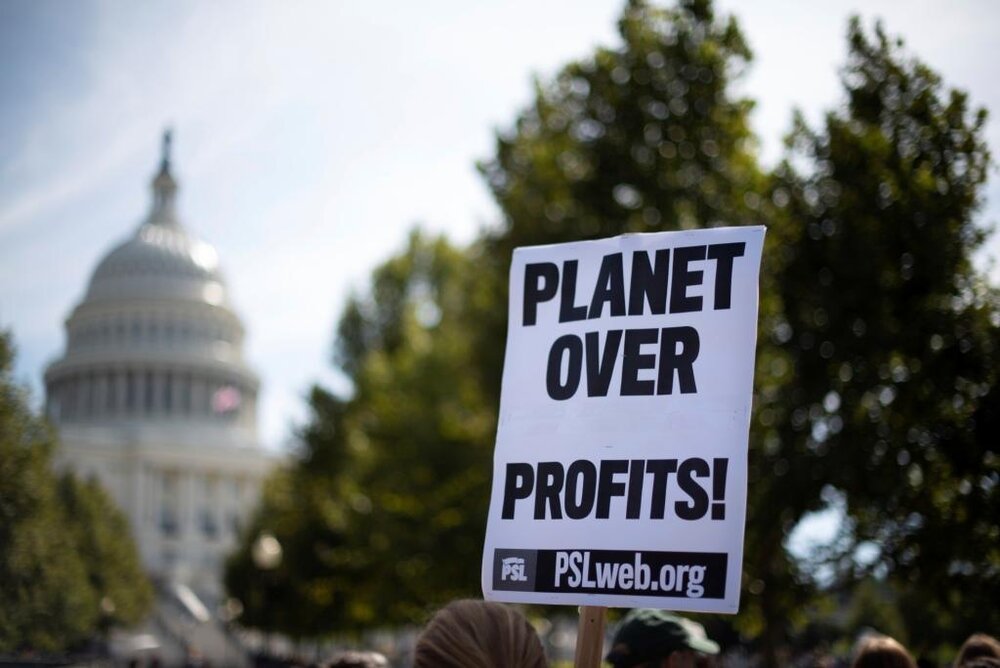As the world burns; One in four U.S. senators hold fossil fuel investments

TEHRAN – As U.S. President Joe Biden aims to assure the world that the United States will fulfill its promise to reduce its greenhouse gas emissions in half from 2005 levels by the end of the decade, a new report published Friday reveals that the members of the U.S. Senate who would have to pass climate legislation are heavily invested in the fossil fuel industry.
Sludge reports the households of at least 28 U.S. senators—in both the Democratic and Republican caucuses—hold a combined minimum of $3.7 million and as much as $12.6 million in fossil fuel investments.
This week at the COP26 climate summit in Glasgow, Biden assured world leaders that the United States would meet its ambitious pledge to slash its greenhouse gas emissions in half by 2030.
For Biden to achieve that, he will need members of Congress to pass legislation to restrict fossil fuels, an industry in which dozens of senators and their households are personally invested.
Sludge has obtained information revealing that the households of at least 28 U.S. senators— both Democrats and Republicans—hold a combined minimum of $3.7 million and as much as $12.6 million in fossil fuel investments.
“Of the 28 senators, at least 20 hold publicly traded stocks in companies like oil supermajor Chevron, pipeline giant Enterprise Products, or electric utility NextEra that belong to trade associations that are lobbying Congress against taking up strong legislation to curb polluting emissions,” the report said.
“Five senators are invested in energy funds built around oil and gas assets, and three own nonpublic stock in private fossil fuel companies. The investments, held by the senators, their spouse, jointly, or a dependent, are disclosed to the Senate Office of Public Records in very broad ranges and often buried in hundreds of pages of scanned paper forms, making a more precise count of their total value impossible.” The report added.
Earlier this year, Common Dreams reported that six Democratic senators have received hundreds of thousands of dollars from fossil fuel corporations. The senators disclose their investments, or those of their spouses, to the Senate Office of Public Records, but details are presented in a very broad manner and often buried in hundreds of pages of paper forms.
Ironically, at least half a dozen of the senators who are personally invested in the fossil fuel industry sit on environment- or climate-related committees in the upper chamber.
The household of Senator Joe Manchin, who is the chairman of the Senate Energy and Natural Resources Committee, has received over $1 million in income from Enersystems, a coal brokerage firm the Democratic senator established in the 1980s.
Manchin "has stripped the Democrats' budget reconciliation bill of major climate programs that would have transitioned coal-fired plants like the one where the company, now run by his son, holds a prime fuel services contract," the report said.
Other senators whose households are heavily invested in fossil fuels include, John Hickenlooper of Colorado holds up to $1 million in investments in Chevron and other companies, Tom Carper of Delaware holds as much as $274,000 in Chevron and Duke Energy shares; Gary Peters of Michigan owns up to $355,000 in NextEra, DTE Energy, and Pacific Gas & Electric stock.
Earlier this year, Common Dreams reported that six Democratic senators—Manchin, Chris Coons (Del.), Maggie Hassan (N.H.), Mark Kelly (Ariz.), Kyrsten Sinema (Ariz.), and Jon Tester (Mont.)—have received hundreds of thousands of dollars in combined campaign contributions from fossil fuel corporations, some of which have touted their purported support for climate action, over the past decade.
The senators have often worked to remove any environmental or clean energy provisions from budget reconciliation legislation to protect their personal investments.
For months, Biden had made no secret of the fact that he wanted to participate in the COP26 climate talks with powerful measures signed into law to prove to the world that the United States was committed to his climate agenda.
However, Biden entered the talks without a convincing deal in hand to present at the UN summit as key components of his domestic climate agenda were frustrated due to powerful fossil fuel interests, fierce opposition from Republicans, and infighting among Democrats.
Scientists have warned that the stakes could not be higher and that failure at the Glasgow summit would hamper the world in its existential fight to limit the global temperature rise to 1.5 degrees Celsius.
